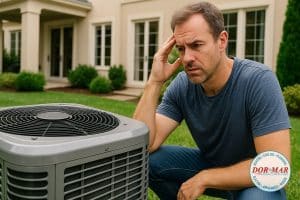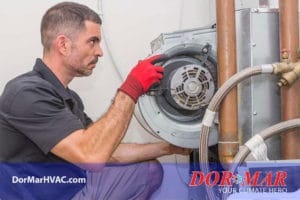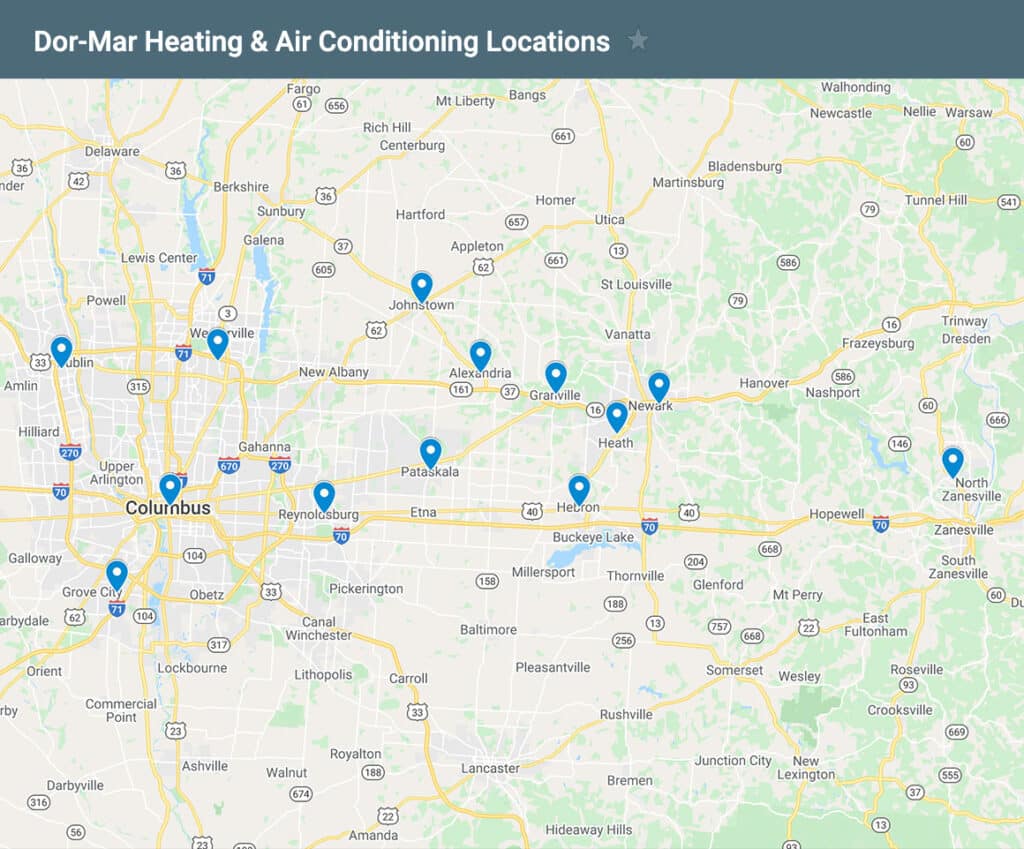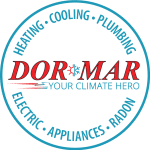When calling your nearby heating repair service when there’s a problem with your furnace, a little homeowner knowledge goes a long way to expedite a repair. This is part of a series of articles to help you better understand how your furnace works.
You may have heard the term “capacitor” in regards to your home’s furnace. What exactly does the capacitor in your furnace do, and what are the symptoms of capacitor problems?
The most important job of a furnace is to move heated air from the furnace out into the home. Every furnace has a blower motor connected to a large “squirrel cage” fan that performs this job. Every blower motor needs an extra “jolt” of power to lose its inertia and get it turning when it first starts up.
As a matter of fact, if your home also has central air conditioning, the blower motor also functions to push cool air throughout the house during the summer months. The capacitor plays an integral role in keeping your home comfortable year-round.
The start capacitor’s job is to provide that extra burst of energy to spin the blower motor and get the fan moving in your furnace. It does that by storing power until it’s needed.
Furnace Capacitor Trouble Indicators
The fan or blower motor may not be able to start and blow air without the capacitor there to provide that “jump start,” so it provides a pretty vital function. It’s important to recognize some of the symptoms that indicate the capacitor might be the problem. Following are tips to help home DIY detectives troubleshoot furnace problems (with a focus on the capacitor).
- Turn the thermostat above the current room temperature to see if the blower motor starts within a few minutes.
- When it starts turning, the blower motor may hum slightly, then slowly turn until it gets up to full speed. If the blower doesn’t start, and you hear a loud hum from within the furnace, there is something preventing it from turning. Sometimes this can be caused by a faulty start capacitor. (It may also be your blower motor is physically unable to turn, blocked by excessive dirt of a small forest creature that made its way into your furnace during the summer).
- If you hear a “clicking” sound when the furnace is trying to start, but the fan motor never actually turns and blows air, that could also indicate a bad capacitor.
- Furnaces have built-in thermal overload switches that trip when the furnace overheats. A bad capacitor can cause the furnace to run too hot internally and may trip a safety switch, causing the furnace to shut down temporarily.
- If you notice an electrical burning smell when the furnace is trying to start, that may be an indicator the electrical wires supplying power to the capacitor are corroded or frayed.
- If the blower runs slower and/or hotter than normal, that might indicate the capacitor isn’t holding the charge it needs to turn the blower motor. This could lead to a blower motor problem down the road.
PLEASE NOTE: When troubleshooting, do not let the furnace attempt to run for more than a couple of minutes without the blower motor starting. A bad capacitor can cause damage over time to a furnace’s blower motor. Only let it run just long enough to hear the hum. If it doesn’t start, turn the thermostat back down or cut the power to your furnace. Letting it run longer could make the problem worse and do more damage to the furnace, resulting in a much higher repair bill.
There is another capacitor, called a “run capacitor” in your HVAC system. These capacitors provide a steady stream of electrical energy to the fan motors in your system. A run capacitor uses its charge to boost the current that provides electric power to the fan motor.
In air conditioners, there are “dual run capacitors” that serve two functions: one provides power to the fan motor (just like in the furnace) and another sends power to the compressor.
Capacitors play an integral part in the running of a home’s heating and cooling system, but should not be trifled with! They store a charge of power that must be discharged prior to servicing or they can cause a shock if handled incorrectly.
It’s always a good idea to call certified heating and cooling professionals near you to safely handle troubleshooting and repairs on your furnace and air conditioner. If your furnace is suffering from any of these symptoms, we recommend calling a certified furnace repair specialist. In the case of no heat, Dor-Mar can get someone to your home the same day.
Fortunately, Dor-Mar has a solution for any of the problems you may experiencing with your furnace.
Schedule an appointment for your Furnace Tune-Up with us today by using our online contact form, or call one of our seven neighborhood offices listed below. We pride ourselves on our customer-focused service, and our reviews show it.
NEWARK 740.345.6639 • COLUMBUS 614.238.6689 • DUBLIN 614.545.8939 • REYNOLDSBURG 614.365.1579 • WESTERVILLE 614.381.1540 • GROVE CITY 614.595.3098 • ZANESVILLE 740.454.2420
Dor-Mar…Your Climate Hero!















